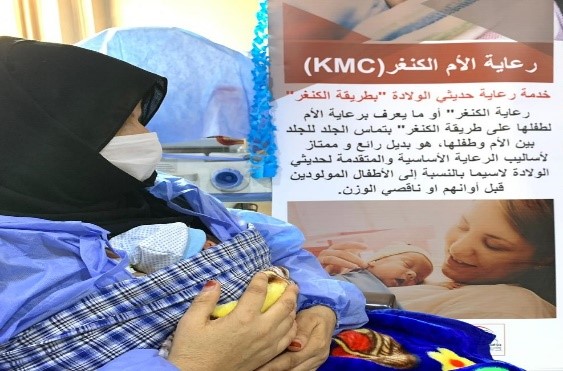This year’s World Prematurity Day slogan is “Together for babies born too soon – Caring for the future: Supporting families – Supporting healthcare professionals – Strengthening healthcare systems” [1].
From the city of Mosul in Iraq comes a story on this theme. Mosul is located approximately 400 km northwest of Baghdad on the west bank of the Tigris River. It is still recovering from the violence that gripped it and destroyed much of its infrastructure over the years of occupation by ISIS forces in 2014-2017[2].
Prematurity is the leading cause of newborn deaths all over Iraq, including in Mosul. A journey to save babies born premature started in September 2017, when the Ministry of Health (MOH), in a partnership with UNICEF, sent a team of national master trainers from one of the Maternity Teaching Hospitals in Baghdad (Al-Elweya Hospital) to a regional Kangaroo Mother Care (KMC) workshop organized by UNICEF in Beirut, Lebanon. The Al-Elweya hospital commenced institutionalization of KMC right after the workshop. Under the leadership of the hospital manager, the Newborn Care Unit (NBCU) was rehabilitated to secure suitable space for KMC, and the hospital has made intermittent KMC available to small and preterm babies since May 2018. Hospital staff have been gaining experience and confidence in providing KMC, and Al-Elweya is now recognized as a center of excellence for providing full package of essential newborn care including KMC. After this successful experience, MOH and UNICEF jointly conducted multiple advocacy sessions on how to scale up KMC. In late 2018, MOH endorsed a plan of introducing KMC in one main maternity hospital in each of Iraq’s 19 Governorates. By early 2020, six additional hospitals were fully prepared, equipped, and ready to start intermittent KMC. Doctors and qualified nurses were trained, and by first quarter of 2020 (before COVID-19 hit Iraq), all these six hospitals had started KMC.
The city of Mosul did not give up despite COVID-19. Building on these successes, Mosul health authorities continued to revitalize essential Maternal and Newborn Health (MNH) services in the city. They have requested an exceptional approval from the central MOH to continue local workshops and training and followed strict instructions to take full infection prevention and control IIPC) measures in each workshop, limiting participants (maximum 15), physical distancing and proper hand and respiratory hygiene. Staff from three hospitals were not only trained on KMC, but also on counselling and communication skills and essential newborn care. All activities were implemented by local professionals and program managers keen to provide services to their local communities in the liberated areas of Ninawa Governorate. Many essential supplies and equipment were also procured locally (e.g. binders for holding babies in close skin-to-skin contact). Remote support from MOH program managers, national trainers, and UNICEF’s MNH specialist have been provided virtually and through mobile communication to ensure quality implementation of training activities.
All three hospitals introduced intermittent KMC by September 2020. Up to the end of October, 62 preterm babies were admitted to the NBCU in Al-khansa hospital, and 20 weighing less than 2000 gm were managed successfully with intermittent KMC and breastfeeding. In Mosul hospital, among 38 preterm newborns admitted to NBCU, 7 were managed and discharged well with KMC after stabilization. At Al-Hamadanyia, which started the intervention in late September, they have provided intermittent KMC for babies weighing 1800 gms. The hospital is now waiting for rehabilitation of some parts of the NBCU, to create better space to provide more babies with KMC.
The intervention greatly supported the mothers whose newborn babies have been admitted to the NBCU. Most are from remote areas of Mosul city. In the dedicated KMC rooms in the hospitals, mothers can provide skin-to-skin contact with ease and in private while adhering to IPC measures.
The intervention has also supported healthcare professionals in this challenging time. This new intervention gives healthcare professionals opportunities to train and develop professionally to support mothers and families with proper skills and competencies including supporting mothers with confidence on how to feed their small babies with breastmilk, either directly from breast or using extracted breastmilk in cups.
Together for babies born too soon – we will never stop caring for the future through supporting families and supporting healthcare professionals.
*if you would like to know more about the story, please also visit: The full story of KMC in Mosul city published on UNICEF Iraq webpage on Tuesday, 17 Nov.2020 (#2020WPD) https://www.unicef.org/iraq/stories/babies-born-too-soon
[1] World Prematurity Day 2020 Advocacy Message Guide. Available from https://www.healthynewbornnetwork.org/hnn-content/uploads/2020_WPD_Advocacy_Message_Guide.pdf
